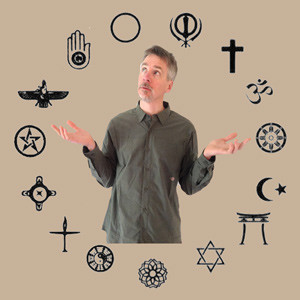 Submitted by Unique Vision on
Submitted by Unique Vision on

I entertained myself last night perusing what the net had to say about the “spiritual but not religious”. It seems that a lot of people just don’t get it.
No, I’m not talking about the usual New Age crowd of spiritual dabblers. Of course they don’t “get it”. But the spiritual cowboys of the world don’t get it with or without a religious affiliation (and keep in mind many of them do have one). The ones who seem to be struggling with the concept — who reduce it entirely to that stereotype of mere dabblers — are religious figures.
I am not someone in opposition to religion, per se. In fact I see it as a valuable thing. I wish I were a member of a spiritual community. It’s not indifference, stubbornness, ignorance, or the absence of spiritual maturity that makes me a soloist. It’s that established spiritual communities — both religions and their monastic subsets — have failed miserably at adapting to the 21st century.
Information is no longer scarce, yet religions are mired in a previous era of information scarcity. Fundamentalists maintain artificial scarcity with the threat of hellfire and damnation on the one hand and an information-deprived alternative religious media on the other, but the rest of us move in a world where texts and communities to discuss them with 24/7, are only as far away as the length of g-o-o-g-l-e-dot-c-o-m.
We have a historical precedent for what happens when previously scarce information becomes less scarce: the invention of movable type. Few areas of life were affected as profoundly by that invention as religion. Prior to the invention, books were rare and precious things, produced by scribes and guarded by an elaborate hierarchy of scholars, who were largely conterminous with the hierarchy of the Catholic church. While I do not doubt that a millennium or so of dominance fosters corruption, it is unfair to the mediaeval Church to portray it an impediment to progress. As long as information was rare, it needed an army of guardians, and that is what it found in the Church. It was the Church that kept learning alive and made progress possible: that ultimately made both the printing press, and Martin Luther, inevitable.
Movable type democratized learning, religion, and politics, because if information is available to anyone who had the opportunity to learn to read and the money to buy a book (i.e., to the middle class) why then should decision making not also be in the hands of those who understand the questions of the day? Books made hierarchical religious monoculture obsolete.
The internet takes the devolution of power one step further: it anarchizes information. Information is free, or nearly so, for anyone who cares to make the effort. In such a situation, even “democratic” structures look oppressive. It is small wonder that the political rebellion bursting out all over has been making decisions, not by majority vote, but by modified consensus. The 21st century human is Homo Anarchus. No one waves a Masters degree in Theology in front of Homo Anarchus and tells it to sit up straight, stay awake, and stick its donation in the collection basket.
Yet that is exactly what the tone-deaf critics of those who identify as spiritual but not religious are saying. They can’t conceive of community without hierarchy, and see the deteriorating social connectedness brought about by a dying capitalism as identical with the wishes of Homo Anarchus, when instead they should be looking to a mass Occupy assembly as the blueprint for the future. When you ask almost anyone who identifies as “spiritual but not religious” about what it means to them, what you hear is “I don’t want anyone telling me what to think” and “I value community” — essentially the platform of Emma Goldman and Giovanni Baldelli, transmuted to the religious sphere.
I dream of a 21st Century religion. I crave a 21st century religion. Nothing would make me happier than for me to hang up my self-identification as a monastic without portfolio and, well, get myself a portfolio. A 21st century religion is not unimaginable to me. It is perfectly possible to bond with others on the basis of perennial philosophy and a bucket of tolerance for its myriad expressions and misexpressions. It is perfectly possible to organize on the principles of DIY and consensus. It is never right to force anyone to surrender their conscience in the name of conformity to a religious community, nor is it reasonable to stifle religious expression in the name of conformity to formal procedures.
But religious leaders tsk-tsking about us “spiritual but not religious” can’t see any of this.It is as incomprehensible to them as a superhighway might be to a buggymaker lobbying to keep horseless carriages off the road.
Can we just get it over with and #occupy religion and be done with it?
- 2151 reads